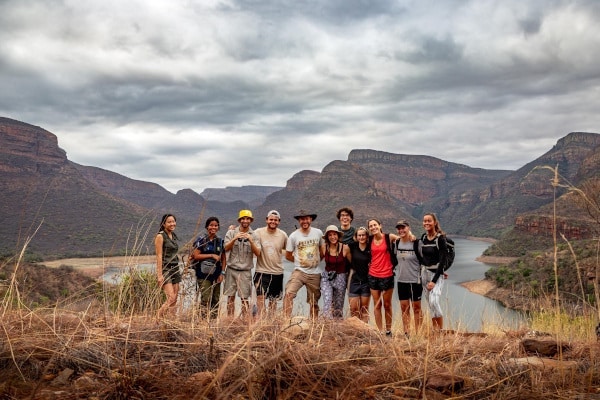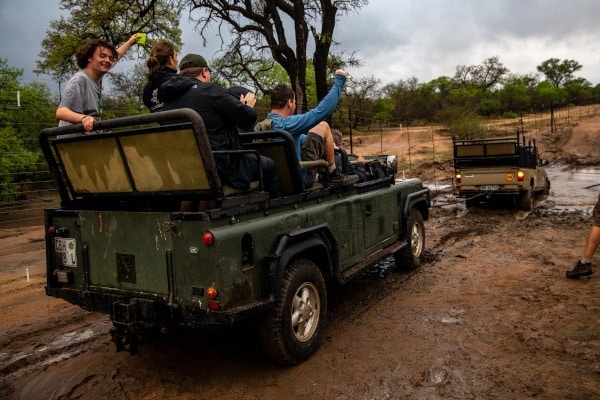When it comes to incredible wildlife encounters in South Africa, the Greater Kruger Area is simply unparalleled. Sharing a fenceless border with the iconic Kruger National Park – often considered one of the best game parks for wildlife viewing in Africa – the Greater Kruger Area is a sprawling expanse of over 20 private game reserves.
This exclusive region allows travellers to embark on exhilarating game drives throughout the African bush to experience up-close encounters with some of the area’s most iconic wildlife. Roaming freely from the Kruger National Park, travellers in the Greater Kruger Area can expect to see Africa’s big five – lions, leopards, rhinos, buffalo, and elephants – among other stunning wildlife, without the crowds that often fill the neighbouring national park. The Greater Kruger Area is a hub for some incredible conservation efforts that aim to protect South African wildlife. Travelling to this stunning region means embarking on endless wildlife conservation adventures that are as impactful as they are exciting. If you are looking to experience Africa’s wildlife in an authentic, impact-driven setting, the Greater Kruger Area is the ultimate destination for you.
Our projects are developed alongside local communities to ensure the work we do is ethical, responsible, and relevant to the needs of their communities. Our teams live and work alongside these communities, which allows us to offer sustainable and transformative experiences that provide real value where it is most needed.


You will be staying at Olifants River Camp in the heart of the African wilderness. It is a traditional bush lodge set in a big 5 reserve with all the facilities and furnishings you need for a comfortable and authentic stay in Africa.
The team are passionate about environmental conservation, and it is reflected in how the lodge is run. Recycling, sustainable use of resources, environmental education, and the use of locally grown produce and ethically sourced ingredients are all important aspects of life at Olifants River Camp
Available year round.
Nearest airports: Johannesburg or Hoedspruit.
Climate :The project is situated in the Lowveld – a semi–arid region. We are blessed with good weather all year round. Summer season (October to March) can be wet and hot. The hottest months are usually December, January and February. Winter Season (April to September) is dry and sunny. The coolest months being June and July when it does get cold at night and early mornings
ENVIRONMENTAL SUSTAINABILITY
African wildlife is hurting in unprecedented ways, making sustainable conservation work necessary to ensure our animals’ future.
Only between 3,500 and 5000 Wild Dogs remain on the planet (International Union Conservation of Nature).
Africa’s elephants are now classed as endangered and critically endangered (2021).(2021).Ling
Habitat loss is identified as a main threat to 85% of all species described in the IUCN’s red list.
Conflict between humans and animals is one of the main threats to the continued survival of many species across the world and is also a significant threat to local human populations.
Across Africa, wildlife is under intense threat. Negative interactions with humans and environmental dangers like climate change have put South Africa’s impressive species in a precarious situation, with many at risk of extinction within the century. When you join our wildlife conservation efforts in South Africa, you will work to support sustainable conservation efforts that put the lives of African wildlife and communities first. You can learn in depth about the issues that surround human and wildlife conflict and look at some long term solutions.
Embarking on game drives into the heart of the African bush, your work will focus on conducting valuable field research on the local wildlife’s health, behavior, and populations. This research will be integral to informing conservation decisions in the area, ensuring long-term wildlife preservation aims across the Greater Kruger Area are met in the best way possible. Your teams could be involved in one of the following conservation programs.
CAMERA TRAPS AND RESEARCH
We utilise camera traps to capture valuable data on animals. These camera traps help us see animals we wouldn’t normally see on game drives. In the past these photos have helped us identify injured animals, we have spotted poachers, we have even seen very elusive animals such as leopards, pangolins and more.
Students can help us record essential data on their health, migration patterns and behaviors. Working with our research team, you will add your observations to databases that are foundational to informing sustainable conservation efforts.
PHYSICAL CONSERVATION PROJECTS
On our projects there are always plenty of rewarding opportunities to practice physical wildlife conservation techniques. These modest conservation tasks, such as removing invasive species, significantly improve wildlife habitats and support healthy populations.
All our itineraries are tailored for every school.
10, 21 and 28 day
Itineraries are also available.
21 and 28 day itineraries can be combined
with our Cape Town Project.
This itinerary is a sample
Day
Activity
Morning
Afternoon
Evening
Day 1
Depart UK
Depart UK
Travel
Overnight Flight
Day 2
Arrive into Johannesburg Airport
You will be met on arrival and transferred to your accommodation
Orientation and welcome. Visit apartheid museum in Johannesburg.
Welcome dinner
Day 3
Excursion
Visit Cradle of Humankind, a UNESCO world heritage site
Transfer to Greater Kruger project site
Welcome, Orientation and Dinner
Day 4
On project
Outline project goals and activities
Survival activity, Build a shelter!
Cultural night
Day 5
On project
Conservation overview
Set Camera traps
Movie night
Day 6
On project
Review camera trap pictures and learnings
Game Count
Game Drive
Day 7
On project
Human/Wildlife Interaction presentation
Game Drive
Dinner
Day 8
On project
Visit Farmers of the Future project site. Meet farmers and help in the garden.
Meet Farmers
Review and planning session
Day 9
On project
Physical conservation work
Physical conservation work
Dinner
Day 10
On Project
Research game drive
Review and learning session
Planning sesion
Day 11
Excursion
Visit Hoedspruit
Research game drive
Review, Learnings and dinner
Day 12
Excursion
Panorama Route, Full day excursions
Panorama Route, Full day excursions
Panorama Route
Day 13
Depart
Transfer to Johannesburg
Depart for UK
Overnight Flight
Day 14
Arrive home
Arrive back in UK
Price Inclusions
Exclusions

AFRICAN IMPACT SALES AND MARKETING LIMITED: Company Number 13434590 © All rights reserved